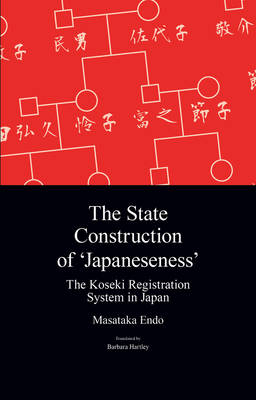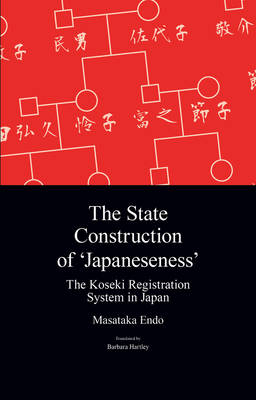
- Afhalen na 1 uur in een winkel met voorraad
- Gratis thuislevering in België vanaf € 30
- Ruim aanbod met 7 miljoen producten
- Afhalen na 1 uur in een winkel met voorraad
- Gratis thuislevering in België vanaf € 30
- Ruim aanbod met 7 miljoen producten
Zoeken
€ 95,95
+ 191 punten
Uitvoering
Omschrijving
For more than 140 years, Japan's koseki registration system has functioned as the official means by which an individual qualifies as 'Japanese'. Information concerning each family is entered into one koseki register record in a system that documents the status relationship information of Japan's population based on the notion of 'bloodline'. Tracing the history of the koseki registration system from its inception in the Meiji era through its use in Japan's colonial holdings in the pre-war era and to the present day, The State Construction of 'Japaneseness' challenges the very foundations of the system, arguing that it promotes prejudice and discrimination and fosters a divisive understanding of the 'Japanese' as a people. This significant work presents conclusive evidence on how the koseki registration system has used deeply problematic understandings of ethnicity, citizenship and the family to define 'the Japanese', excluding and discriminating against those unable to fit into the framework of this highly politicised bureaucratic system.
Specificaties
Betrokkenen
- Auteur(s):
- Uitgeverij:
Inhoud
- Aantal bladzijden:
- 360
- Taal:
- Engels
- Reeks:
Eigenschappen
- Productcode (EAN):
- 9781925608816
- Verschijningsdatum:
- 10/05/2019
- Uitvoering:
- Hardcover
- Formaat:
- Genaaid
- Afmetingen:
- 142 mm x 216 mm
- Gewicht:
- 566 g

Alleen bij Standaard Boekhandel
+ 191 punten op je klantenkaart van Standaard Boekhandel
Beoordelingen
We publiceren alleen reviews die voldoen aan de voorwaarden voor reviews. Bekijk onze voorwaarden voor reviews.











